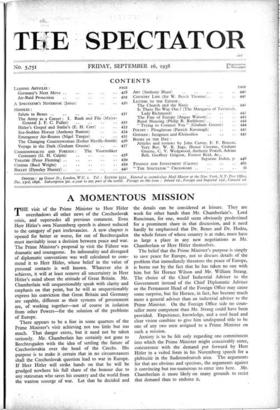A MOMENTOUS MISSION
THE visit of the Prime Minister to Herr Hitler overshadows all other news of the Czechoslovak crisis, and supersedes all previous comment. Even Herr Hitler's own Nuremberg speech is almost reduced to the category of past irrelevancies. A new chapter is opened for better or worse, for out of Berchtesgaden must inevitably issue a decision between peace and war. The Prime Minister's proposal tp visit the Fiihrer was dramatic and courageous. Its informality and disregard of diplomatic conventions was well calculated to com- mend it to Herr Hitler, whose belief in the value of personal contacts is well known. Whatever else it achieves, it will at least remove all uncertainty in Herr Hitler's mind about the attitude of Great Britain. Mr. Chamberlain will unquestionably speak with clarity and emphasis on that point, but he will as unquestionably express his conviction that Great Britain and Germany are capable, different as their systems of government are, of working together—not of course in isolation from other Powers—for the solution of the problems of Europe.
There appears to be a fear in some quarters of the Prime Minister's visit achieving not too little but too much. That danger exists, but it need not be taken seriously. Mr. Chamberlain has certainly not gone to Berchtesgaden with the idea of settling the future of Czechoslovakia over the head of the Czechs. His purpose is to make it .certain, that in no circumstances shall the Czechoslovak question lead to war in Europe. If Herr Hitler will strike bands on that he will be grudged nowhere his full share of the honour due to any statesman who saves his country and the world from the wanton scourge of war. Let that be decided and the details can be considered at leisure. They are work for other hands than Mr. Chamberlain's. Lord Runciman, for one, would seem obviously predestined for a prominent share in that discussion, and it need hardly be emphasised that Dr. Benes and Dr. Hodza, the whole future of whose country is at stake, must have as large a place in any new negotiations as Mr. Chamberlain or Herr Hitler themselves.
The belief that the Prime Minister's purpose is simply to save peace for Europe, not to discuss details of the problem that immediately threatens the peace of Europe, is borne out by the fact that he has taken no one with him but Sir Horace Wilson and Mr. William Strang. The choice of the Chief Industrial Adviser to the Government instead of the Chief Diplomatic Adviser or the Permanent Head of the Foreign Office may cause some surprise, but Sir Horace, in fact, has become much more a general adviser than an industrial adviser to the Prime Minister. On the Foreign Office side no coun- sellor more competent than Mr. Strang could have been provided. Experience, knowledge, and a cool head and clear vision combine to give him undisputed title to be one of any two men assigned to a Prime Minister on such a mission.
Anxiety is to be felt only regarding one commitment into which the Prime Minister might conceivably enter, concurrence with the demand put forward by Herr Hitler in a veiled form in his Nuremberg speech' for a plebiscite in the Sudetendeutsch area. The arguments for that are obvious and specious, the arguments against it convincing but too numerous to enter into here. Mr. Chamberlain is more likely on many grounds to resist that demand than to endorse it.










































